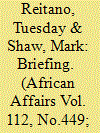|
|
|
Sort Order |
|
|
|
Items / Page
|
|
|
|
|
|
|
| Srl | Item |
| 1 |
ID:
123508


|
|
|
|
|
| Publication |
2013.
|
| Summary/Abstract |
SOMALIA IS NAVIGATING THE MOST PROMISING LANDSCAPE for peace and stability that the blighted country has seen in more than two decades. The successful political transition that culminated in the creation of a federal republic, the election of a broadly representative national government headed by a cadre of invested civil society leaders, and a rollback of the militant terrorist group Al-Shabaab are promising signs for the future. However, there are a number of factors that will restrict the capacity of the central state to coalesce effectively and assert its role. Al-Shabaab, while eroded and increasingly fragmented, still has considerable capacity to trigger violence and instability, as the June car bombing of the UN compound demonstrated. The structure of the state remains incomplete, with little progress on formalizing the constitution and establishing the electoral process, and a number of major points of contention remain, including the movement to establish a new regional Jubaland state to the west of Mogadishu.
|
|
|
|
|
|
|
|
|
|
|
|
|
|
|
|
| 2 |
ID:
156428


|
|
|
|
|
| Summary/Abstract |
Targeted killings or ‘hits’ have become a feature of South Africa's political economy, both licit and illicit. Given their current and potential impact they are understudied. In this article, we present data for hits for a 16-year period from 2000 to 2015. Hits represent the application of targeted violence aimed at removing particular individuals and sending wider signals about power relations to promote a variety of political, economic or criminal interests. Given that they are increasingly contracted out to hired killers, hits are themselves a commercial arrangement, and we argue that they represent a shift from more ideological motivated killings during the political struggles of the 1980s and 1990s. They are also deeply symptomatic of the broader challenges of corruption and rent seeking in South Africa, particularly at local and provincial levels. Such killings, and the availability of killers for hire, draw on several ‘nurseries of violence’ and they link to wider sets of criminal activity, such as in the taxi industry, in gangs and organized crime, in the private security industry, as well as within state agencies.
|
|
|
|
|
|
|
|
|
|
|
|
|
|
|
|
| 3 |
ID:
141476


|
|
|
|
|
| Summary/Abstract |
There is increasing international concern about the growth of organized crime in Africa. Important criminal organizations and professional criminals are present in Africa, but we argue that the term “organized crime” is not a very useful description of their activity, since what we are actually witnessing is a reformulation of politics and crime into networks that transcend the state/non-state boundary in ways that are hardly subsumed in standard concepts of organized crime. Similar processes are taking place in various parts of the world, and thus African countries are not exceptional in this regard. The process, however, does take particular forms in Africa that arise out of the histories of individual countries. The article describes the evolution in countries as diverse as Libya, Guinea-Bissau, and Zimbabwe of a market for protection, as business people – legitimate and otherwise – seek protection for their activities and their personnel. This market for protection is created by making private arrangements, often with state officials working in private capacities. The implications are profound: they could amount to a new mode of governance connecting Africa to international markets and institutions in which the distinctions between licit and illicit economic activity become difficult to detect.
|
|
|
|
|
|
|
|
|
|
|
|
|
|
|
|
| 4 |
ID:
142548


|
|
|
|
|
| Summary/Abstract |
Guinea-Bissau has been regularly described as a ‘narco-state’. Yet, few studies analyse how drug trafficking has evolved here. Based on extensive interviews in Guinea-Bissau over several years, this paper documents the process. It concludes that using the term ‘narco-state’, where much of the state has little or no capacity, is inappropriate. A better approach is to analyse the actions of key players as an elite protection network. In Guinea-Bissau, that network did not act on its own, but relied on a series of ‘entrepreneurs' who operated as an interface between traffickers and the elite. While the military as an institution is often said to be in charge of trafficking, exclusive control by high-ranking military personnel within the elite network only occurred relatively late. Senior soldiers' attempts to provide more than just protection, and to enter the drug market themselves, led to the network's undoing.
|
|
|
|
|
|
|
|
|
|
|
|
|
|
|
|
| 5 |
ID:
057563


|
|
|
|
|
| Publication |
Pretoria, Institute for Security Studies, 2001.
|
| Description |
112p.
|
| Series |
ISS monograph series; no.58
|
| Standard Number |
0620279273
|
|
|
|
|
|
|
|
|
|
|
|
Copies: C:1/I:0,R:0,Q:0
Circulation
| Accession# | Call# | Current Location | Status | Policy | Location |
| 045035 | 363.00968/ROB 045035 | Main | On Shelf | General | |
|
|
|
|
|
|
|
|
|